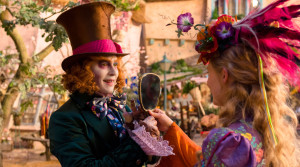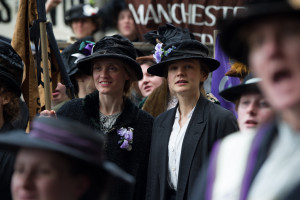Alice Through the Looking Glass (Film)
 Disney’s new film ‘Alice Through the Looking Glass’ hits theaters this weekend and it’s bound to be a huge moneymaker for the studio who is having an excellent year so far.
Disney’s new film ‘Alice Through the Looking Glass’ hits theaters this weekend and it’s bound to be a huge moneymaker for the studio who is having an excellent year so far.
Disney has 13 movies coming out in 2016, but if 2015 was the studio’s best year ever (‘Star Wars: The Force Awakens’ and ‘The Avengers: Age of Ultron’ sequel were massive hits), 2016 looks to be even brighter and bigger for them.
‘Zootopia,’ ‘The Jungle Book’ and ‘Captain America:Civil War’ have made, as of May 16th, close to $1 billion each (!!), and they are still raking in money at the box office, with ‘Captain America’ only a few weeks into it’s release. With the release of ‘Alice Through the Looking Glass,’ is poised to take in more than the 2010 ‘Alice in Wonderland’ film which peaked at just over $1 billion.
‘Alice Through the Looking Glass’ sees the return of the same actors playing the same characters from the 2010 film. Alice (Mia Wasikowska) travels back in time to try to save the Mad Hatter (Johnny Depp). Along the way she reconnects with her friends including the White Rabbit (Michael Sheen), Absolem (the late Alan Rickman) the Cheshire Cat (Stephen Fry), twins Tweedledee and Tweedledum (Matt Lucas), the White Queen (Anne Hathaway) and of course the Mad Hatter. We’re also treated to a delicious turn by both Helena Bonham Carter as the Red Queen (and Alice’s sister) and Sacha Baron Cohen (as Time).
Alice has spent several years sailing the high seas (and following in her father’s footsteps). When she returns to London, she is asked (and demanded) to sign away her ship to her ex-boyfriend James (Ed Speelers). When she attends a meeting with him and her mother (Lindsay Duncan), she goes to an upstairs room and steps through a mirror, and through this mirror Alice takes a journey (literally through the looking glass) to Wonderland. It’s here where she sees all of her Wonderland friends, but something is not right with the Mad Hatter. She needs to turn to Time to correct things in the past that will make the Mad Hatter’s life better. Alice ends up taking a device called the Chronosphere, which allows her to travel back in time. She sees ways where she can help the Mad Hatter, but also comes across the events in her own life, which include a lie that she told as a young girl that tragically affected her sister the Red Queen. It’s all told, as expected from Disney, in very visual colors and 3D.
There was no way that anyone could top Tim Burton’s 2010 film, but James Bobbin (‘The Muppets’ and ‘Muppets Most Wanted’) successfully manages to bring the story back to life, with the help of screenwriter Linda Wolverton (who also wrote ‘Alice in Wonderland’). But no film would be as good as this if it were not for the excellent cast. Wasikoska does her bit as Alice as well as she did in the 2010 film, but it’s the addition of Cohen as Time that adds a fun element to the film, where he, and the Red Queen, live literally in time. And it’s Carter as the Red Queen who steals every scene she’s in. With a huge head, and a huge head of hair, and makeup that’s expertly applied on her face to give her a highly unusual look, Carter chews up every scene she is in (and in my opinion it’s an Academy-Award worthy performance, though it’s rare for a performer to receive one in a Disney movie – though Meryl Streep was nominated for ‘Into The Woods’ – but of course it was Streep!). Expect ‘Alice Through the Looking Glass’ to break the $1 billion ceiling. It will be another hit for Disney, and will keep the studio on track to continue it’s dominance at the box office this year, where they have ‘Finding Dory,’ ‘The BGF,’ and ‘Star Wars: Rogue One’ still to come.
 The plight of the British women who fought for the right to vote is beautifully told in the excellent film ‘Suffragette.’
The plight of the British women who fought for the right to vote is beautifully told in the excellent film ‘Suffragette.’




